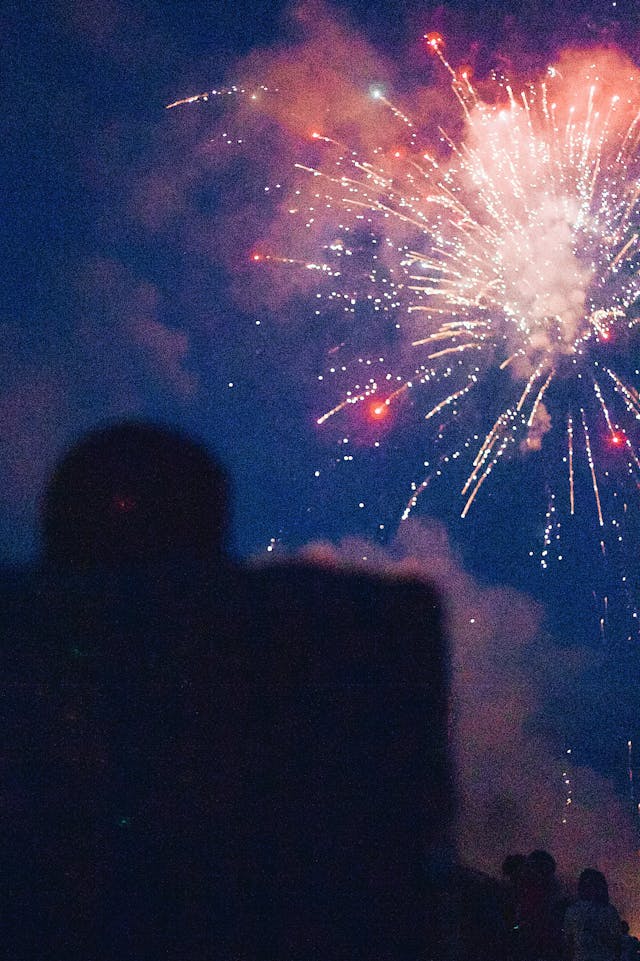The 4th of July is a time of celebration, barbecue, and beautiful fireworks lighting up the night sky. But while we may enjoy the festivities, many of our furry friends find the sounds of fireworks terrifying. Dogs often experience stress, anxiety, and fear during fireworks due to their sensitive hearing and inability to understand what’s happening.
If your dog gets anxious during fireworks, you’re not alone—and there are steps you can take to ease their stress. Here are some expert-backed tips to help your dog get through the 4th of July fireworks safely and calmly.

1. Create a Safe Space Inside Your Home
Before the fireworks begin, set up a quiet and comfortable space where your dog can retreat to feel safe. Choose a room with minimal windows and outside noise. Add familiar items like their bed, toys, and a blanket that smells like you. You can even turn on a fan, white noise machine, or calming music to muffle the sound of fireworks.
2. Stay Calm and Reassuring
Dogs often mirror their owner’s emotions. If you remain calm and act like everything is normal, your dog is more likely to feel secure. Avoid fussing over them too much, as this can reinforce anxious behavior. Instead, speak in a soothing tone and provide gentle reassurance.
3. Use Calming Products
There are several products designed to reduce dog anxiety:
-
ThunderShirt or Anxiety Wraps: These apply gentle pressure, like a comforting hug.
-
CBD or Hemp-Based Treats: Natural calming treats can take the edge off, but check with your vet first.
-
Pheromone Diffusers or Sprays: Products like Adaptil mimic calming pheromones and can help create a sense of safety.
4. Keep Them Indoors During Fireworks
Don’t take your dog outside during fireworks unless absolutely necessary. Even if your dog is normally confident, the loud noise can cause panic and prompt them to bolt or jump fences. Make sure all windows, doors, and doggie doors are securely closed.
5. Exercise Early in the Day
Take your dog for a long walk or have an active play session earlier in the day. A tired dog is generally less anxious and more likely to rest through the fireworks. Physical activity helps release energy and reduce stress levels.
6. Consider Desensitization (Long-Term Strategy)
In the weeks or months before the 4th of July, you can begin desensitizing your dog to fireworks sounds. Play firework noises at a low volume during playtime or meals, and gradually increase the volume as your dog becomes more comfortable. This can help reduce fear over time.
7. Stay Home if You Can
If your dog has severe anxiety, it’s best to stay home with them. Having you nearby can provide the comfort they need. If you must leave, consider hiring a trusted pet sitter who understands your dog’s needs and can keep them company.
8. Talk to Your Vet if Anxiety Is Severe
For dogs with extreme firework phobia, your vet may recommend prescription anti-anxiety medications or sedatives. Don’t attempt to medicate your dog without professional advice. Your vet can help you find the safest and most effective treatment plan.
9. Update Your Dog’s ID and Microchip Info
In case your dog manages to escape due to panic, having up-to-date tags and microchip information increases the chances of a safe return. Before the holiday, double-check that your contact details are current.
10. Skip the Fireworks Show This Year
As much as you may love fireworks, consider skipping the big event to ensure your pet’s well-being. Your dog’s safety and comfort come first, and there will always be other opportunities to watch fireworks.
FAQs About Dogs and 4th of July Fireworks
1. Why are dogs afraid of fireworks?
Fireworks are loud, unpredictable, and unfamiliar. Dogs have sensitive hearing, and the sudden booms can feel threatening. They don’t understand the source or meaning of the noise, which triggers their natural fight-or-flight response.
2. What are signs that my dog is stressed by fireworks?
Signs include trembling, whining, hiding, panting excessively, pacing, trying to escape, or clinging to you. Some dogs may also bark excessively or have accidents indoors due to fear.
3. Should I give my dog medication for fireworks anxiety?
Only under the guidance of your veterinarian. In some cases, anti-anxiety medication or sedatives are necessary, but always use a vet-approved approach. Natural remedies and calming supplements may help milder cases.
4. Can I train my dog not to be afraid of fireworks?
Yes, with time and patience. Desensitization training involves gradually exposing your dog to recorded fireworks sounds paired with positive reinforcement. Start weeks in advance and progress slowly.
5. Are fireworks harmful to dogs even if they don’t seem scared?
Yes, even dogs who don’t show fear may experience stress or hearing damage if exposed to fireworks at close range. It’s always best to keep them safely indoors and away from direct noise exposure.

